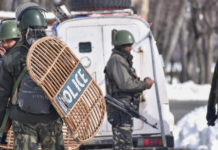The Taliban have appointed their new leader after they confirmed the death of Mullah Omar yesterday.
The Afghan government reported the death of Mullah Omar who led the movement for 20 years on Wednesday, and was confirmed by the Taliban on Thursday.
His deputy, Mullah Akhtar Mansour, will replace him, sources close to the Taliban leadership said.
A Taliban statement did not say where, when or how Mullah Omar died, only that it was from an illness and that he had remained in Afghanistan since the 2001 US invasion.
This conflicts with the account given by the Afghan government, who claimed Mullah Omar died in hospital in the Pakistani city of Karachi two years ago. Pakistan has always denied that he was in the country.
The death has disrupted peace talks between Afghanistan and the insurgents, with a second round of negotiations due today postponed.
Pakistan, which had been set to play host, said they were put back at the request of the Taliban’s leadership amid uncertainty over Mullah Omar’s death.
Subscribe to our newsletter and stay updated on the latest news and updates from around the Muslim world!
Disunity
The naming of Mullah Mansour as Taliban leader was far from unanimous and followed days of intense debate.
Sources close to the movement’s shura council say many senior commanders and other Taliban seniors were unhappy with the decision.

They are thought to include the movement’s top military commander, Mullah Qaum Zakir, as well as Tayeb Agha, the head of the Taliban’s political office in Qatar, and Mullah Habibullah, a member of the Quetta shura.
It is said that the aforementioned would have preferred Mullah Omar’s son, Yaqoob, to succeed him, and accuse “pro-Pakistani circles” of imposing Mullah Mansour on them.
A Taliban statement distancing the movement from more talks with the Afghan government reflects splits over how to proceed.
Mullah Mansour who is pro-talks, has been given the title of “Amir” (leader) – not “Amir ul-mu’mineen” (leader of the faithful), the title that Mullah Omar had.
The group appointed Siraj Haqqani, a key leader in another major Afghan military group, the Haqqani network, as Mansour’s deputy, sources said.
Haqqani has a $10m (£6.4m) US bounty on his head for alleged involvement in an attack on a Kabul hotel that left six people dead, and for his participation in cross-border attacks on US and coalition forces.
Mansour becomes only the second person to lead the Taliban after Mullah Omar, who founded the group during Afghanistan’s civil war in the early 1990s.
His alliance with al-Qaeda leader Osama Bin Laden prompted the US-led invasion of Afghanistan in 2001.
He had been in hiding ever since, and although was not thought to have significant day-to-day involvement in the group remained a key figurehead.






















